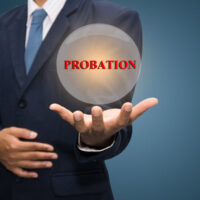What Happens When You Violate Your Probation?

A probation violation is a very serious matter that can lead to revocation of probation, jail, and even prison. By being aware of why this is the case, and what goes into the process, it’s easier to prevent the legal consequences of a probation violation.
What Is a Probation Violation?
A probation violation is an incident in which an individual, who is currently on probation, violates one of the terms of their probation order. Some examples of common probation violations are as follows:
- A probationer who is late when visiting their probation agent.
- A probationer who misses one of their restitution payments.
- A probationer who uses illegal drugs, such as cocaine.
- A probationer who fails to show up for work and/or school.
- A probationer who fails to show up and perform their community work service obligations.
- A probationer who changes their address without informing their probation agent.
- A probationer who contacts people that are on the “no-contact” list imposed by the court.
Even though those violations are relatively minor, they can lead to serious legal consequences.
What Are The Legal Consequences Of A Probation Violation?
A probation violation can, and often does, lead to a variety of legal consequences. Many of these legal consequences are, in the grand scheme of the legal system, relatively minor. But, they can still have a significant effect on the individual who is found to have violated the terms of their probation order.
Some of the most notable legal consequences of a probation violation are as follows:
- The first violation can lead to a sentence of no more than 15-days in jail.
- The second violation can lead to a sentence of no more than 30-days in jail.
- The third violation can lead to a sentence of no more than 45-days in jail.
Every single one of the above is due to the “Justice Reinvestment Act,” which went into effect in 2016.
Even though these legal consequences are in effect, a probation violation is a civil matter – a civil matter that requires appearing before a judge who will then consider the exact circumstances of the probation violation. With this information in mind, the judge will then make the legal decision that they feel is most appropriate.
Can You Go Back To Prison If You Violate Your Probation?
The simple answer to this question is “Yes.” A variety of probation violations and circumstances can lead to a judge revoking an individual’s probation and, therefore, forcing them to return to prison.
Even though such a decision is relatively uncommon, it can, and does, happen. Some of the violations and circumstances that can lead to a judge revoking an individual’s parole are as follows:
- A probationer robbing someone and, thereby, committing a serious crime.
- A probationer committing an act of domestic violence.
- A probationer trafficking drugs and/or any other illegal substances.
- A probationer murdering an individual.
- A probationer consistently failing to satisfy the requirements of their probation, or absconding from supervision altogether.
Many of the violations and circumstances outlined above are quite serious and, as such, serve as new crimes. The presence of these new crimes means that their current probation agreement is off the table and that they will be charged with the new crimes, while also being forced to finish the sentence for their previous crimes.
Do You Need Legal Help?
Are you in need of legal assistance with a probation violation case? If so, then the best thing you can do is to contact a trusted Bel Air criminal lawyer today.
We at Schlaich & Thompson, Chartered in Bel Air, Maryland, have more than 60 years of legal experience in criminal law.
You can contact us today for an initial consultation and we will assist you in obtaining the best possible legal outcome for your probation violation case.
Sources:
ma4jr.org/parole-violations-2/#:~:text=A%20technical%20violation%20of%20parole,agent%2C%20or%20use%20of%20marijuana
mgaleg.maryland.gov/mgawebsite/legislation/details/hb0839?ys=2019rs
law.justia.com/codes/maryland/2010/correctional-services/title-7/subtitle-4/7-401#:~:text=%2D%20If%20a%20parolee%20is%20alleged,place%20that%20the%20Commission%20designates.





















